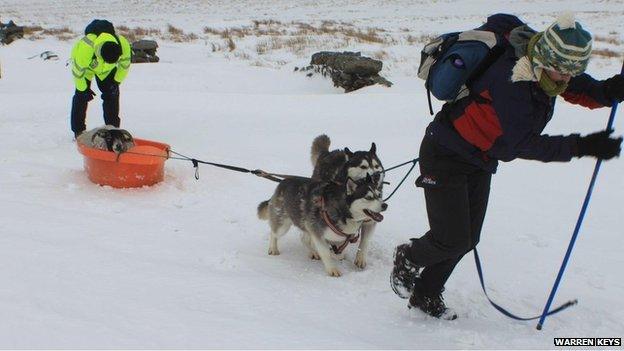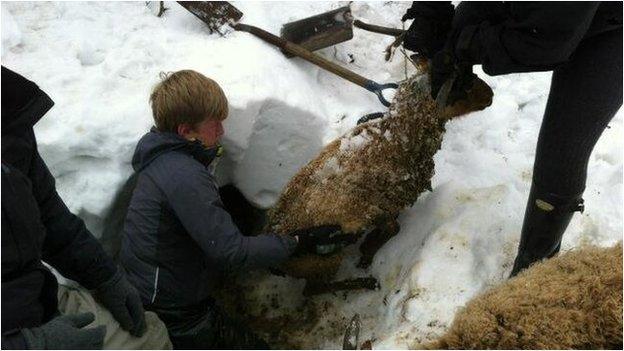Isle of Man public thanked for help in farming crisis
- Published

Isle of Man farmers have thanked the Manx community for helping in the search for livestock buried in the snow.
Farmers face "catastrophic losses" after heavy snow fall brought drifts of up to 20ft in some rural areas.
An emergency helpline led to hundreds of people coming forward to help find sheep and cattle lost in the snow.
A government spokesman said farmers had been"overwhelmed by the massive show of support and concern".
He added: "Access to livestock is still an issue and public help has been greatly appreciated on lowland farms, but we do not advise that members of the public attempt to access the mountain areas in the search for sheep unless there is a supervised rescue."
According to the Isle of Man meteorological office, the island's recent snowfall was the heaviest since 1963.
Forecaster Neil Young said: "To our knowledge, these are [the] worst drifts on the Isle of Man since then.
"It was forecast four or five days in advance and we sent out a severe weather warning but there is very little preparation you can make for something like this.
"The worst hit areas seem to have been on the west coast of the island, places like Patrick, Kirk Michael, Peel, Glen Maye Dalby and St John's."
Agriculture Minister Phil Gawne said the weather has caused "devastation" on the island.
He added: "The council of ministers has agreed to fund some kind of emergency support for the agriculture industry."

Many Isle of Man companies gave staff time off to help farmers recover their stock
About 90% of the Isle of Man is given over to agricultural production with in the region of 450 farms, some with only a few livestock but some with hundreds.
"The first thing we are going to do is waive the fee for disposing of dead animals, that will help in the short term and as soon as we have an idea of the full extent of the problem we can look at providing some financial assistance," Mr Gawne said.
The government said there had been a large number of livestock casualties, particularly sheep and lambs.
"Unfortunately it will take some time to move all the bodies particularly taking into account the large deposits of snow and the access difficulties," said an agriculture department spokesman.
John Kennaugh from Ballaleece, who has been a famer all his life in the St John's area, said: "Of course we have seen bad conditions in our time but I think last Friday was one of the worst days I can remember.
"In one day we had rain, snow, wind and frost. We could have dealt with anyone of those individually but when they all came together, its was an unfolding horror story."
- Published26 March 2013
- Published25 March 2013
- Published25 March 2013
- Published22 March 2013
- Published13 February 2013
- Published21 January 2013